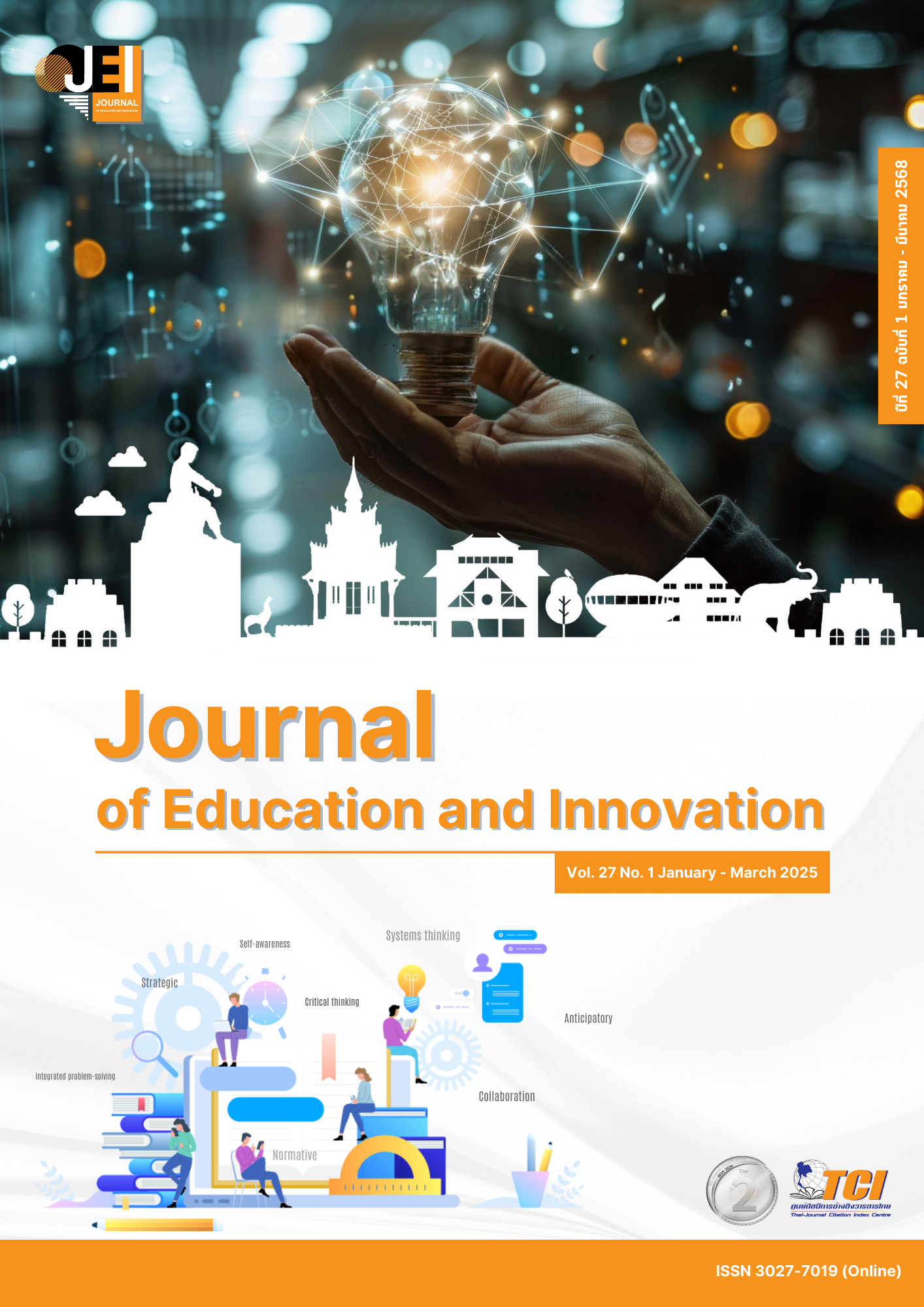A MODEL FOR DEVELOPING LEARNING SKILLS IN THE NEW NORMAL ERA TO ENHANCE DIGITAL CITIZENSHIP IN SMALL SCHOOLS UNDER THE OFFICE OF PHAYAO PRIMARY EDUCATION SERVICE AREA
Main Article Content
Abstract
This research aimed to study learning skills in the new normal era of students in small schools, examine the enhancement of digital citizenship among students in small schools, and develop a model for improving learning skills in the new normal era to promote digital citizenship in small schools under the Office of Phayao Primary Education Service Area. The sample consisted of 234 teachers from small schools. The research instruments were questionnaires and a model evaluation form. Quantitative data were analyzed using descriptive statistics, including frequency, percentage, mean, and standard deviation. Qualitative data were analyzed through content analysis and data classification. The research findings were as follows: 1) Learning skills in the new normal era for small schools under the Office of Phayao Primary Education Service Area comprised five skills: critical thinking, communication, collaboration, creative thinking and innovation, and information technology skills. Overall, these skills were rated at a high level. 2) Digital citizenship of students in small schools consisted of three aspects: respect for yourself and others, educate yourself and others, and protect yourself and others. Overall, these aspects were rated at a high level. 3) The model for developing learning skills in the new normal era to enhance digital citizenship in small schools under the Office of Phayao Primary Education Service Area was named "5 Skills, 3 Characteristics of Digital Citizenship in the New Normal Era (S5 REP)". It consisted of three operational components: 1) development of four learning skills, 2) five learning skills of students in the new normal era, and 3) three aspects of students' digital citizenship.
Article Details

This work is licensed under a Creative Commons Attribution-NonCommercial-NoDerivatives 4.0 International License.
The owner of the article does not copy or violate any of its copyright. If any copyright infringement occurs or prosecution, in any case, the Editorial Board is not involved in all the rights to the owner of the article to be performed.
References
Battelle for Kids. (2019). Framework for 21st Century Learning. Retrieved May 27, 2023, from https://www.battelleforkids.org/networks/p21
Bilbai, S. (2015). Competencies, skills, and roles of Thai teachers in the 21st century. Bangkok: Phranakhon Rajabhat University.
Chaemchoy, S. (2018). School administration in the digital era. Bangkok: Chulalongkorn University Press.
Chaisorn, P. (1987). Practical performance assessment. Journal of Educational Measurement, 8(23), 37-61.
Choi, M. (2016). A Concept Analysis of Digital Citizenship for Democratic Citizenship Education in the Internet Age. Theory & Research in Social Education, 44(4), 565–607. DOI: 10.1080/00933104.2016.1210549
Chuseangnil, C. (2018). The era of digital citizenship. Retrieved June 20, 2023, from https://www.scimath.org/article-technology/item/8659-2018-09-11-07-58-08
Conbach, L. J. (1990). Essentials of Psychological Testing (5th ed). New York: Harper & Row.
DecCecc, J. P., & Crowfor, R. C. (1974). The Psychology of Learning and Instruction: Educational Psychology. (2nd ed). Englewood Cliffs, NJ: Prentice-Hall.
Indeed Editorial Team. (2021). Learning Skill: Definition and Examples. Retrieved July 5, 2023, from https://www.indeed.com
Kalyanamitra, K. (2021). Essential skills for the future of work in the post-COVID-19 era. MCU Buddhabanya Review Journal, 6(3), 163-176.
Klangnarong, S., & Ruangnopakul, N. (2021). Digital citizenship and dealing with online dark sides in the new normal. Retrieved June 22, 2023, from https://blog.cofact.org/digitalcitizen/
Kraiwit, P. (2017). Strategies for developing private school administrators based on digital citizenship concepts (Doctoral dissertation). Bangkok: Chulalongkorn University.
Krejcie, R. V., & Morgan, D. W. (1970). Determining Sample Size for Research Activities. Educational and Psychological Measurement, 30(3), 607-610.
Narasri, P., & Boontham, T. (2021). Needs assessment for developing essential skills for primary school teachers in Saraburi province. Academic Journal of Rattana Bundit University, 16(2), 91-104.
Nokkaew, P. (2019). Life and career skills in the 21st century of Mathayom 3 students in Samut Prakan province (Master thesis). Bangkok: Rajamangala University of Technology Thanyaburi.
Office of Knowledge Management and Development (OKMD). (2021). 8 digital citizenship skills. Retrieved June 20, 2023, from https://www.okmd.or.th/okmd-kratooktomkit/4673/
Pajorntit, A., Yamkasikorn, M., & Boonamphai, T. (2016). Development of an instructional model to enhance problem-solving skills for cadets at Chulachomklao Royal Military Academy. Journal of Research and Development, 11(2), 399-408.
Pawabut, Y. (2022). Development of activity sets to promote digital citizenship for primary school students (Master thesis). Nakhon Phanom: Nakhon Phanom University.
Phayao Provincial Education Office. (2022). Small school management plan for academic year 2022. Phayao: Phayao Provincial Education Office.
Phayao Primary Educational Service Area Office 1. (2019). 4-year basic education development plan (2019-2022). Phayao: Phayao Primary Educational Service Area Office 1.
Phayao Primary Educational Service Area Office 2. (2022). Annual action plan for fiscal year 2022. Phayao: Phayao Primary Educational Service Area Office 2.
Ribble, M. (2015). Digital Citizenship in Schools: nine elements all students should know (3rd ed). Virginia: International Society for Technology in Education.
Sanguankaew, W. (2015). Digital citizenship. Retrieved June 22, 2023, from https://www.stou.ac.th/study/sumrit/1-59(500)/page2-1-59(500).html
Samphan, P., Ngamprakon, S., & Chamnisart, B. (2023). Guidelines for developing innovative teaching and learning management in small schools under Phra Nakhon Si Ayutthaya Primary Educational Service Area Office 1. Graduate Studies Journal, Mahamakut Buddhist University, 21(2), 197-207.
Team Leverage Edu. (2022). Learning Skills for Students. Retrieved July 10, 2023, from https://leverageedu.com/blog/learning-skills/
Thai PBS. (2020). "New normal" - The Royal Institute has coined the Thai term. Retrieved March 16, 2023, from https://www.thaipbs.or.th/news/content/292432
White, S., Rakkhanto, S., & Srikruedong, S. (2021). Humans and digital citizenship. Journal of MCU Human Sciences Review, 7(2), 339-355.
Wongyai, W., & Patphol, M. (2022). Learning and development skills. Bangkok: Center for Innovative Leaders in Curriculum and Learning.
Yoo-ngam, Y., Inthusamit, M., & Nawasit, S. (2016). A model for developing 21st century skills in students through participatory action research: A case study of Ban Nong Dok Bua School, Loei Primary Educational Service Area Office 1. Journal of Educational Administration KKU, 12(2), 13-23.


